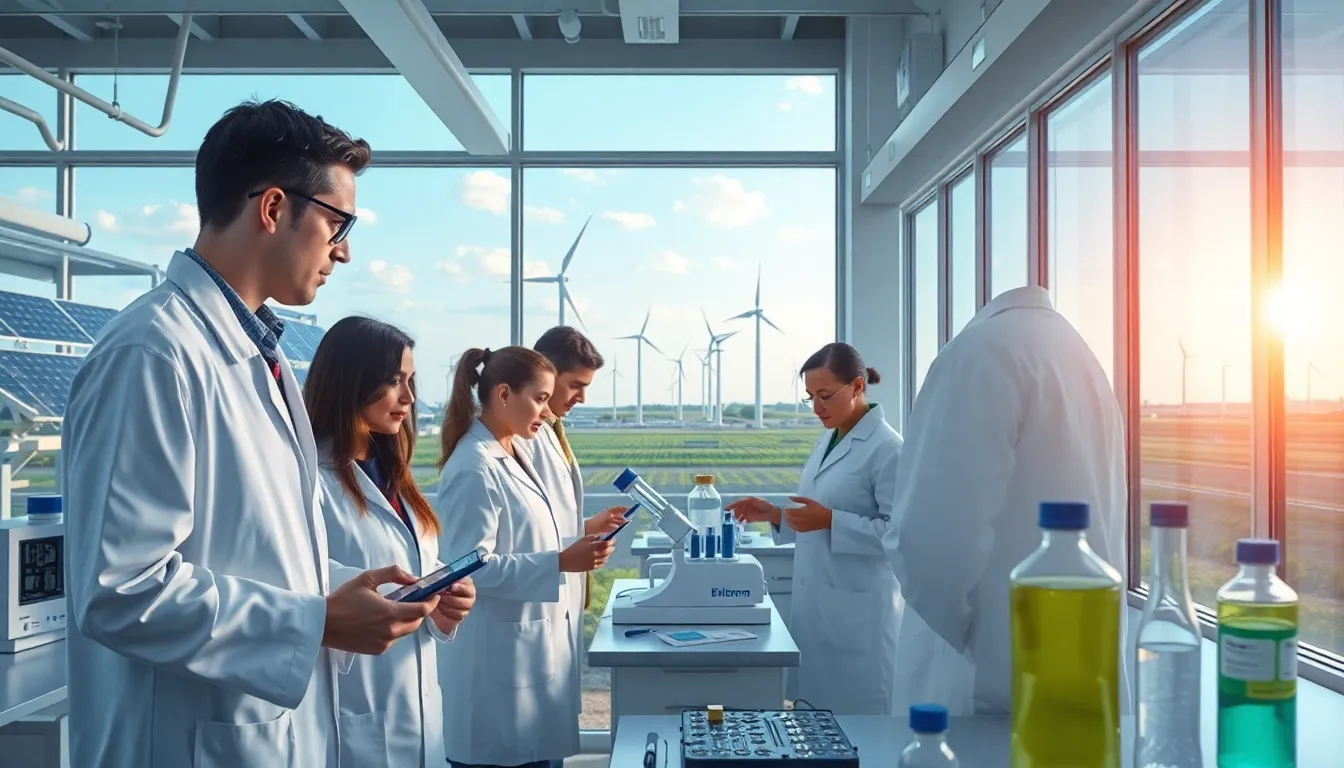In a world where robots might just take over your job and smartphones seem to have a mind of their own, staying updated on the latest science and technology news is more crucial than ever. With groundbreaking discoveries and innovative gadgets popping up faster than you can say “quantum computing,” it’s easy to feel a bit lost in the digital shuffle. But fear not—this article’s got you covered.
Table of Contents
ToggleOverview Of Latest Science And Technology News
Recent breakthroughs in scientific research shape various industries. Artificial intelligence advancements enhance automation efficiency in manufacturing and service sectors. Renewable energy technologies, such as solar and wind power, reduce dependency on fossil fuels while promoting sustainability.
In medical science, gene editing tools like CRISPR continue to evolve, offering hope for treating hereditary diseases. Robotics innovations contribute to improving surgical precision and patient outcomes. Quantum computing emerges as a powerful solution for tackling complex problems beyond classical computer capabilities.
Global initiatives focus on tackling climate change through innovative technologies. Electric vehicles gain traction with more manufacturers producing high-efficiency models, reducing carbon footprints. Data privacy concerns stimulate robust discussions, prompting companies to adopt stricter regulations and better security measures.
Space exploration captures significant attention with missions to Mars yielding essential findings about the planet’s atmosphere and potential for life. Recent developments in telescopes allow astronomers to uncover distant galaxies and study cosmic phenomena.
Collaboration between tech companies fosters progress in various fields like biotechnology and environmental science. Startups introduce groundbreaking applications targeting real-world challenges, from agricultural innovation to smart cities. This collaborative landscape enhances knowledge sharing and accelerates discovery, benefiting society as a whole.
Breakthroughs In Scientific Research

Recent discoveries in various fields of science showcase advancements that significantly impact society. Innovations in medical research and environmental science highlight humanity’s progress towards a healthier planet.
Medical Innovations
CRISPR technology continues evolving, presenting new opportunities for gene editing that can potentially eradicate hereditary conditions. Researchers recently reported success in using this tool to modify genes linked to certain types of cancer. Additionally, wearable health monitoring devices are gaining traction, providing patients and doctors real-time data on vital signs. These innovations enhance early diagnosis and patient care, contributing to better health outcomes. As telehealth solutions grow, they also streamline access to healthcare, ensuring more individuals benefit from quality services without geographic limitations.
Environmental Discoveries
Recent findings in renewable energy show significant progress in solar panel efficiency, with some models achieving an efficiency of over 30 percent. Advances in wind turbine technology increase energy production capacity, making wind farms more viable as energy sources. Innovations in carbon capture methods emerge as potential game-changers, helping industries reduce greenhouse gas emissions effectively. The rise of lab-grown meat contributes to sustainability by decreasing the environmental impact of traditional livestock farming. These discoveries collectively address urgent climate challenges and facilitate a transition towards a greener future.
Advancements In Technology
Recent technological advancements continue to shape numerous fields, including artificial intelligence and space exploration. These innovations are revolutionizing the way societies function and interact.
Artificial Intelligence
Artificial intelligence has seen remarkable growth, enhancing automation and decision-making across industries. In healthcare, AI algorithms now help in diagnosing diseases with impressive accuracy, streamlining patient care. self-learning systems are improving customer experiences in retail by personalizing recommendations. Moreover, advancements in natural language processing enable machines to understand human conversations better, facilitating smoother interactions. AI’s role is expanding in areas like transportation, where autonomous vehicles are being tested in major cities. This technology promises safer and more efficient travel options.
Space Exploration
Space exploration is undergoing a renaissance, with new missions providing valuable insights into our universe. NASA’s Perseverance rover has been investigating Mars, searching for signs of past life and collecting soil samples. Innovations in rocket technology are making space travel more accessible and cost-effective, paving the way for commercial space endeavors. As telescopes improve their capabilities, scientists are uncovering distant galaxies and contributing to understanding cosmic evolution. International collaboration has also become vital, with agencies like ESA and NASA working together on ambitious missions, such as the Artemis program aimed at returning humans to the Moon.
Impact On Society
Advancements in science and technology shape societal progress in numerous ways. Transformations in various sectors lead to significant changes in daily life and the global economy.
Economic Implications
Emerging technologies drive economic growth by creating new industries and enhancing productivity. Automation and artificial intelligence reduce operational costs while increasing efficiency in sectors like manufacturing and logistics. The rise of renewable energy technologies presents opportunities for job creation in green industries, contributing to sustainable economic development. Investment in research and development leads to innovations that support market competitiveness, positioning nations favorably in the global economy.
Ethical Considerations
Ethical dilemmas arise as technology advances rapidly, challenging societal norms and regulations. Issues like data privacy, surveillance, and algorithmic bias necessitate transparent governance to ensure ethical use. Medical breakthroughs, such as gene editing technologies like CRISPR, provoke debates about the moral implications of altering human DNA. Collaboration between stakeholders is essential to navigate these dilemmas responsibly, balancing innovation with ethical integrity. Societal trust hinges on addressing these considerations thoughtfully, maintaining public confidence in scientific progress.
Future Trends To Watch
Artificial intelligence (AI) is set to transform industries, with its impact already evident in healthcare and retail. Enhanced automation increases productivity, making operations more efficient across various sectors. Quantum computing emerges as another pivotal technology, offering solutions to complex problems that traditional computing struggles to solve.
Sustainability plays a crucial role in future developments. Renewable energy technologies, such as solar and wind power, are advancing rapidly. Researchers report solar panels achieving efficiencies exceeding 30 percent, while innovations in wind turbine design boost energy production significantly. Carbon capture methods are evolving, providing practical ways to combat climate change.
The medical field also sees exciting trends. CRISPR technology is progressing in its ability to modify genes related to certain cancers, showcasing promise in gene therapy. Wearable health devices gain popularity, enhancing early diagnosis and streamlining patient care through continuous monitoring. Telehealth services expand access to healthcare, providing vital support in underserved areas.
Space exploration captures public interest, with new missions aimed at uncovering the mysteries of Mars. NASA’s Perseverance rover conducts research on the Martian surface, while international initiatives, like the Artemis program, aim to return humans to the Moon. Advancements in rocket technology make space travel increasingly accessible, paving the way for future exploration endeavors.
Emerging technologies also raise ethical concerns. Data privacy issues and algorithmic bias necessitate transparent governance, ensuring responsible development. Discussions regarding the moral implications of gene editing technologies like CRISPR highlight the need for public dialogue on these topics. Collaboration among stakeholders becomes essential, balancing innovation with ethical integrity as society navigates these advancements responsibly.
Startup companies drive innovation, addressing real-world challenges and fostering progress in biotechnology and environmental science. These collaborative efforts contribute significantly to social well-being, underscoring the interconnectedness of technology and society in shaping a sustainable future.
Staying updated on the latest science and technology news is essential in today’s fast-paced world. Breakthroughs in fields like artificial intelligence renewable energy and medical science are not just transforming industries but also shaping everyday life. As advancements continue to unfold the implications for society are profound.
With innovations driving economic growth and addressing pressing challenges like climate change and healthcare access the future holds immense potential. However navigating the ethical considerations that accompany these advancements is crucial for maintaining public trust.
By fostering collaboration among stakeholders and encouraging open dialogue society can harness these technologies responsibly ensuring a brighter sustainable future for all.




